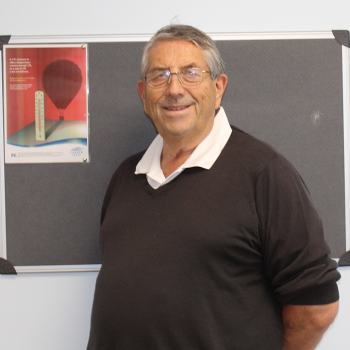‘It’s my lifeline’: Why dialysis patient Andrew is involved in research
Choosing to donate blood may have saved Andrew Norton’s life.

The conversation went something like this:
Nurse: “We can’t take your blood, you’re anaemic.”
Andrew: “No I’m not!”
Nurse: “We’re still not going to take your blood and you’d better see your GP.”
A visit to Andrew’s doctor confirmed the anaemia: a urine test identified blood; and further tests led to an eventual diagnosis of chronic kidney disease (CKD). Four years on, Andrew has an arteriovenous fistula (AVF) created in his arm, visits the Cambridge Dialysis Centre thrice-weekly and is on the steering committee for the recently-launched SONAR trial.
Joining the steering committee, promoting research
Andrew said: “The SONAR trial is using non-invasive ultrasound to monitor the growth of arteriovenous fistulae (AVFs) in new patients.
“As mine was created two years ago, I can’t join the trial but in my role on the steering committee I’m very keen to promote the research to other patients.”
Andrew was invited to join the steering committee by transplant surgeon and Chief Investigator Gavin Pettigrew. Andrew said: “Up to half of all AVF fail within the first year and researchers want to know why this happens and if it can be prevented.
“I was lucky in that my fistula didn’t fail even though it was only two weeks old when I had to start dialysis – doctors like to wait longer for it to develop – after collapsing at a party and being rushed to hospital for emergency treatment!”
Help with travel
In his role on the steering committee Andrew supported the successful application to the Addenbrooke’s Kidney Patient Association (AKPA) for funding to cover travel costs for SONAR participants: “Taking part in SONAR means an extra four hospital visits for patients in the first 10 weeks – and the extra expense could put some patients off, even if they wanted to take part.
“The AKPA funding will hopefully encourage more patients who are about to have fistulae created to join SONAR.”
Active
Andrew’s CKD has not prevented him from joining regional fundraising cycle rides or pursuing his interests of travel and wildlife photography: “You need to be organised and make sure your travel arrangements coincide with your appointment bookings, but it is possible.
“My fistula has literally been my lifeline and any research that can make its benefits even better for more patients has to be worthwhile.”
- SONAR is the acronym for Surveillance Of arterioveNous fistulAe using ultRasound study, sponsored by Cambridge University Hospitals NHS Foundation Trust and the University of Cambridge. It is managed by the Clinical Trials Unit at NHS Blood and Transplant
- To find out more about SONAR visit their website: www.sonartrial.org.uk or Twitter: @SONAR_TRIAL
- The SONAR trial is funded by a £1.8m grant from the National Institute for Health Research (NIHR) Health Technology Assessment programme
- Interested in taking part in research either as a patient or lay member? Find out more here



